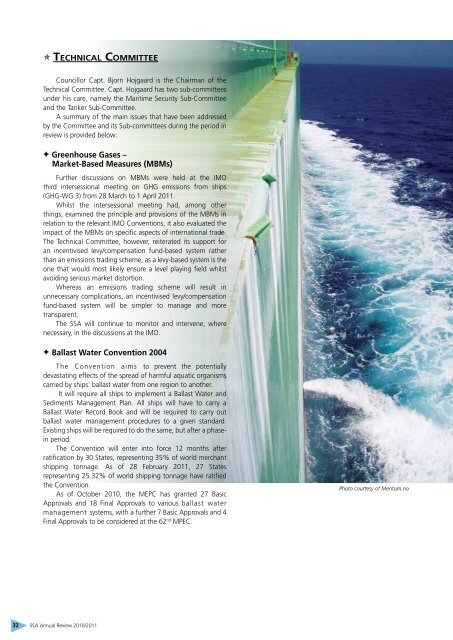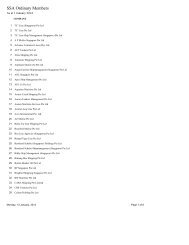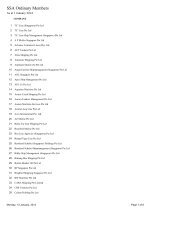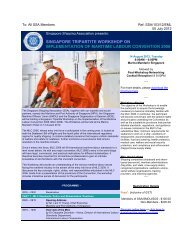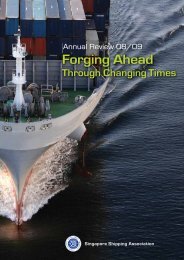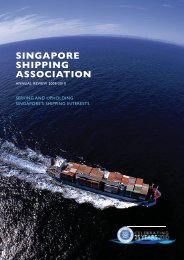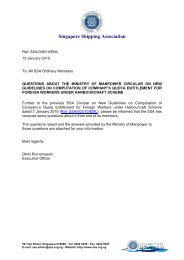operational committee's reports - Singapore Shipping Association
operational committee's reports - Singapore Shipping Association
operational committee's reports - Singapore Shipping Association
Create successful ePaper yourself
Turn your PDF publications into a flip-book with our unique Google optimized e-Paper software.
O TechnIcal commITTee<br />
Councillor Capt. Bjorn Hojgaard is the Chairman of the<br />
Technical Committee. Capt. Hojgaard has two sub-committees<br />
under his care, namely the Maritime Security Sub-Committee<br />
and the Tanker Sub-Committee.<br />
A summary of the main issues that have been addressed<br />
by the Committee and its Sub-committees during the period in<br />
review is provided below:<br />
F Greenhouse Gases –<br />
Market-Based Measures (MBMs)<br />
Further discussions on MBMs were held at the IMO<br />
third intersessional meeting on GHG emissions from ships<br />
(GHG-WG 3) from 28 March to 1 April 2011.<br />
Whilst the intersessional meeting had, among other<br />
things, examined the principle and provisions of the MBMs in<br />
relation to the relevant IMO Conventions, it also evaluated the<br />
impact of the MBMs on specific aspects of international trade.<br />
The Technical Committee, however, reiterated its support for<br />
an incentivised levy/compensation fund-based system rather<br />
than an emissions trading scheme, as a levy-based system is the<br />
one that would most likely ensure a level playing field whilst<br />
avoiding serious market distortion.<br />
Whereas an emissions trading scheme will result in<br />
unnecessary complications, an incentivised levy/compensation<br />
fund-based system will be simpler to manage and more<br />
transparent.<br />
The SSA will continue to monitor and intervene, where<br />
necessary, in the discussions at the IMO.<br />
F Ballast Water Convention 2004<br />
The Convention aims to prevent the potentially<br />
devastating effects of the spread of harmful aquatic organisms<br />
carried by ships’ ballast water from one region to another.<br />
It will require all ships to implement a Ballast Water and<br />
Sediments Management Plan. All ships will have to carry a<br />
Ballast Water Record Book and will be required to carry out<br />
ballast water management procedures to a given standard.<br />
Existing ships will be required to do the same, but after a phasein<br />
period.<br />
The Convention will enter into force 12 months after<br />
ratification by 30 States, representing 35% of world merchant<br />
shipping tonnage. As of 28 February 2011, 27 States<br />
representing 25.32% of world shipping tonnage have ratified<br />
the Convention.<br />
As of October 2010, the MEPC has granted 27 Basic<br />
Approvals and 18 Final Approvals to various ballast water<br />
management systems, with a further 7 Basic Approvals and 4<br />
Final Approvals to be considered at the 62 nd MPEC.<br />
32 SSA Annual Review 2010/2011<br />
Photo courtesy of Mentum.no<br />
F Mandatory Carriage of ECDIS<br />
With effect from 1 July 2012, SOLAS vessels will have to comply with the amendments to SOLAS<br />
regulation V/19 which make the carriage of Electronic Chart Display and Information System (ECDIS)<br />
under SOLAS Chapter V Safety of Navigation mandatory as proposed by NAV 54.<br />
Whilst the Committee welcomed the mandatory carriage of ECDIS, it stressed that industry<br />
would have to address a number of issues to facilitate the shift from paper to electronic charts.<br />
Among other considerations, it would be necessary to review and establish clear company policies on<br />
ECDIS, train ships’ officers, review bridge procedures and to select a service provider that can meet<br />
the company’s needs.<br />
F Maritime Security Sub-Committee<br />
Chaired by Capt. George Solomon of Neptune Orient Lines Ltd, the Sub-Committee worked<br />
closely with the MPA, the ReCAAP Information Sharing Centre (ISC), the Republic of <strong>Singapore</strong><br />
Navy (RSN) and other maritime security providers to discuss proposed measures and submissions<br />
concerning maritime security and to make appropriate recommendations, including practical<br />
measures, to improve security arrangements for ships.<br />
The Sub-Committee analysed the latest situation of piracy and armed robbery that threatened<br />
international shipping around the world. With statistical and situational <strong>reports</strong> from the International<br />
Maritime Bureau (IMB) and the ReCAAP ISC, the Sub-Committee studied the modus operandi of the<br />
pirates.<br />
The <strong>Association</strong> expressed great anger and outrage at the increasing number of attacks on<br />
merchant ships and also the brutality shown by Somali pirates. In 2010, attacks by Somali pirates<br />
accounted for almost 50% of all attacks worldwide.<br />
Whilst the <strong>Association</strong> maintain its strong stance that all governments must act decisively and<br />
expeditiously to eradicate piracy and attacks on ships, it also acknowledged that industry must also<br />
be prepared to do its part. The <strong>Association</strong> therefore urged all member companies to comply fully<br />
with the voluntary Best Management Practices (BMP) promulgated by the International Maritime<br />
Organisation and industry associations.<br />
Despite the measures contained in the BMP, the <strong>Association</strong> observed that some shipowners<br />
have opted to engage private armed guards aboard their vessels to safeguard their seafarers. In this<br />
regard, the <strong>Association</strong> supported MPA’s submission calling for the IMO to discuss the development<br />
of guidance for shipowners and ship operators on the employment of private armed security service<br />
providers onboard their ships to deter and counter piracy in the Gulf of Aden, the Indian Ocean and<br />
the Arabian Sea.<br />
In addition to the threat of Somali pirates, the Sub-Committee also monitored very closely the<br />
situation in other parts of the world, such as the west coast of Africa and the South China Sea.<br />
Photo courtesy of U.S. Naval Forces Central Command.<br />
All governments<br />
must act decisively<br />
and expeditiously to<br />
eradicate piracy and<br />
attacks on ships,<br />
industry must also<br />
be prepared to do<br />
its part.<br />
SSA Annual Review 2010/2011<br />
33


